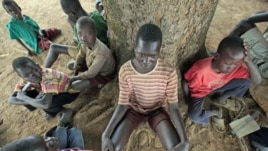 A World Health Organization official has described the recently concluded international scientific conference on the mysterious nodding syndrome as a great achievement in the fight against the disease.
A World Health Organization official has described the recently concluded international scientific conference on the mysterious nodding syndrome as a great achievement in the fight against the disease. Dr. Joaquim Saweka, the World Health Organization’s country representative in Uganda, told VOA that the conference held in Kampala aimed at bringing together everyone interested in the study of the disease, in order to gauge what knowledge currently exists, and to identify critical gaps in that knowledge.
“We also agreed to have a common designation,” he said. “It is now nodding syndrome,” unlike in the past, when the disease has gone by different names.
Another achievement of the conference, he said, is the “agreement on a common case definition.” He explained that in the past the elements that led one to declare a diagnosis of nodding syndrome were different from country to country.
The conference also came up with a platform for future research, and a network of people who are interested in research on nodding syndrome.
The conference, which was organized by WHO, drew international and local medical experts in a bid to find new strategies to respond to the disease.
The disease affects only children, and gradually devastates its victims through debilitating seizures, stunted growth, wasted limbs, mental disabilities and sometimes starvation.
So far the disease has claimed the lives of over 200 children in northern Uganda, and has affected many families.
Although the cause of the disease is not known, Dr. Seweka said, “at least we agreed on case management, so it will be a symptomatic treatment, what should be prioritized, and all the other determinants that should be considered during treatment.”
He said there are commonalities in South Sudan, Uganda and Tanzania, where the disease is concentrated among children, such as an environment infested with a parasite that causes river blindness.
Another common feature, he added, is that most of the children are in the age range of 5 to 15 years, and have some form of nutritional deficiency.
Health experts and researchers from the Center for Disease Control, the UK Department for International Development, UNICEF and global health institutions and universities attended the conference.
They agreed to carry out a comprehensive research study in Uganda, South Sudan and Tanzania to, among other goals, identify the characteristics of the syndrome, and to determine if the disease presents itself with similar symptoms in the three countries.


